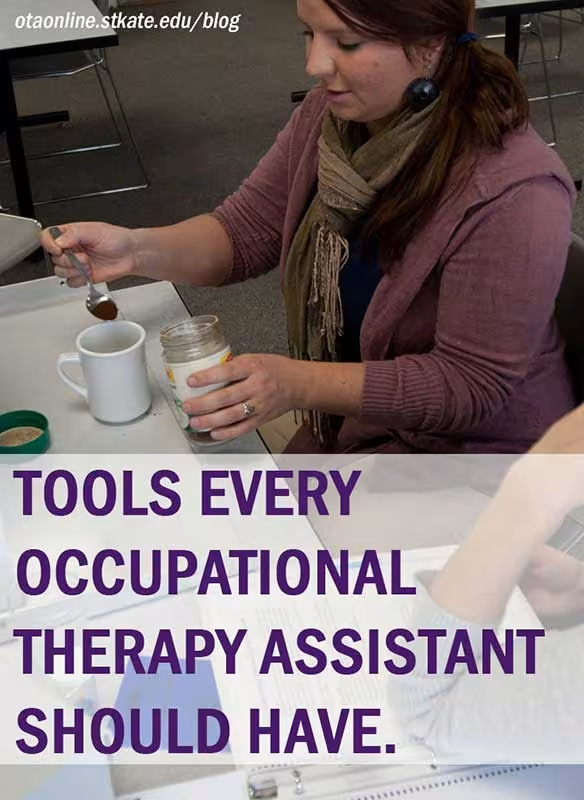Tools Every Occupational Therapy Assistant Should Have
Each blog post is dated and contains accurate information as of that date. Certain information may have changed since the blog post’s publication date. If you would like to confirm the current accuracy of blog information, please visit our online OTA overview page or contact admissions at (877) 233-2677.

Although occupational therapy is a medical field, occupational therapists and occupational therapy assistants don’t need typical medical equipment that doctors and nurses use. Stethoscopes and needles aren’t required when helping children with Sensory Processing Disorder or developmental disorders or adults with improving daily living. While your OTA education is invaluable, you’ll need some important tools with you to be completely prepared to work as an occupational therapist or occupational therapy assistant.
Planner
Working in the occupational therapy field requires a lot of organization. Whether you prefer digital or physical, a planner is your best friend in occupational therapy. Not only do you need to keep track of when your patients' appointments are, but you may be in charge of organizing your patients' schedule. Every patient has different needs, so a single planner will help you see exactly who needs what and when. A digital planner, such as a calendar through your email service provider, will send you reminders of appointments. A physical planner can be carried around with you at all times, so you don’t need to worry about your phone or tablet battery dying and not having access to your schedule.
Computer
With technology advancing so quickly, it’s not very common to meet someone who doesn’t have a computer, and almost every career requires a computer. This is just as true for occupational therapists and occupational therapy assistants. Digital files on each patient can be easily accessed, and new research is constantly being published about certain disorders and treatment options. Computers are also helpful in treating patients. Younger patients who have Sensory Processing Disorder (SPD) may need special keyboard covers that you can order per the size of your computer and carry around with you.
Pencil Grips of Various Sizes
Whether you’re working with children with Autism Spectrum Disorder (ASD) or an adult with decreasing muscle function and strength, pencil grips can be useful in many different types of therapy. Children with Sensory Processing Disorder may not like the feeling of wood or plastic in their hands but may respond well to foam or rubber grips. Grips will also help them learn how to properly hold a pencil. Pencil grips offer a larger area for adults with weak hand muscles to hold, which requires less strength.
Art Supplies
Children with ASD may not be able to express themselves in a fully coherent way. Art may help these children. Patients with SPD can experience different textures with paper, pipe cleaners, paint, sand, and crayons. Creating small crafts for children, such as gluing different colors of macaroni noodles to different colored sections on a box, can help them develop fine motor skills. Whenever there is a sale, stock up on plenty of glue, glitter, paper, crayons, and colored pencils. Even older patients who have dementia can relearn how to tie shoes or better express themselves through art.
Handouts
As much work as you put in with your patients, you can’t be with them every hour of the day. While you work with patients, you may also be working with a caretaker. You can spend some time with parents of ASD or SPD children teaching them how to work on certain activities at home. Adults who require occupational therapy may require additional help at home for certain activities. Offering primary caregivers a handout will help them take care of the person they love, while simultaneously offering additional reinforcement of certain lessons and activities for the patients.
Now is the time to start making a difference in the lives of others. Get in touch with us today to learn about how to become an occupational therapy assistant.


